#signalis analysis
Explore tagged Tumblr posts
Text
I feel like bioresonance, as it's shown in Signalis, is pretty interesting.
Despite how little is known about it in universe, the player actually does get told quite a lot when compared to some other vague concepts of key importance (The Empress, The Great Revolutionary, etc...). But the player isn't just told about it, they're also shown alot of cases in which it is used, be it subtly or rather overtly. Some of it requires reading between the lines, but others, the game just kinda just says: "Yeah that's because of bioresonance".
I am curious as to how other people interpret this power, especially because I feel like at first they kind of present it as a nebulous stand in for what a lot of other sci-fi series have in terms of mysterious mind power. Like, Star Wars has the force, the cyberpunk genre tends to dabble in telepathy or other similar powers, Warhammer 40k has its psykers, Locked Tomb series with Necromancy, etc... Where bioresonance feels like it differs from these other powers, though, is in the scale. When cataloging all the things bioresonance has been used for, and is implied to be useful for, it manifests less as a little-understood power that's use spans from telepathy and telekinesis, to enabling Replika creation. Rather it comes off more and more as literal god powers, or more specifically the power to create reality. Spoilers under the cut:
One of the earliest uses of the power that also comes across as it's most obvious use is as essentially mind reading or telepathy.

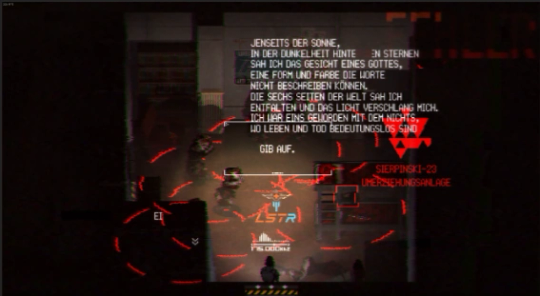
It's used by the Kolibris as a form of peacekeeping, rooting out dissenting thought, or detecting trouble before it reveals itself. We know that they can use it to communicate with others but is especially useful within the cadre. Through these units we also learn it can be used to create illusions, that it can be used to directly harm people, and that in universe it probably functions on a wavelength in some way as it's affected by the radio. A document on the Kolibris calls them the most bioresonantly capable Replika to be created, and while I don't necessarily doubt that's the case I don't think it's as straight forward as they are "the best" at bioresonance. This is because the of the Falkes. It's worth mentioning that these units as of the events of the game are still considered "prototypes" so it may mean they aren't being considered in what units are most bioresonantly capable, and upon their release would then take on that title from the Kolibris, but for the sake of argument I want to continue as if they are included in the comparison of capability.

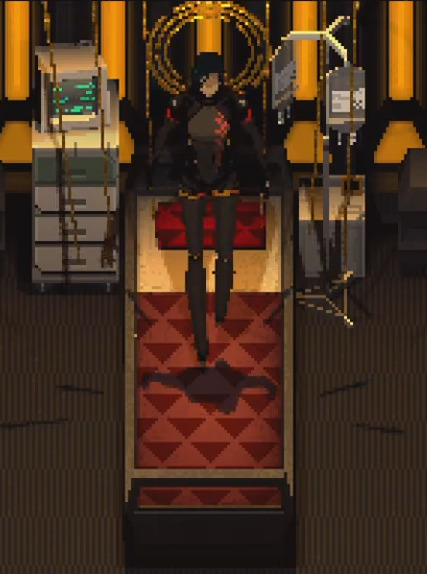
According to Yuri Stern, Kolibris are incapable of telekinesis, a power that Falke on the other hand is clearly able to use. But on top of that Falke also appears to have the power to manifest both her spears and her halo at will. Prior to her awakening neither is anywhere to be found, and she also manifests the shields later. This contrasts the Kolibris who are only able to create illusions. (Falke likely can also create illusions, and communicate telepathically through her switching between appearing corrupted and normal, and also her calling corrupted Aras mid-fight, but we also see the Mynah do the same so there's not much proof in that. So if she can it's to a lesser degree). With that in mind it's very possible that Falke isn't so much better at bioresonance than the Kolibris, but rather is a savant in a different field of the power all together, possibly even multiple or all. And where the Kolibris are far more capable of utilizing the full range of power their field of bioresonance they command, Falke only scratches the surface of her own. Hers being the direct creation and manipulation of reality, hence why she is called a regarded as a god. Other feats Falke can be seen doing range from, using blasts of the power, which seem to take the form of orbs of space which appear manipulated in a way that looks similar to gravitational lensing (gravity will come up again later).
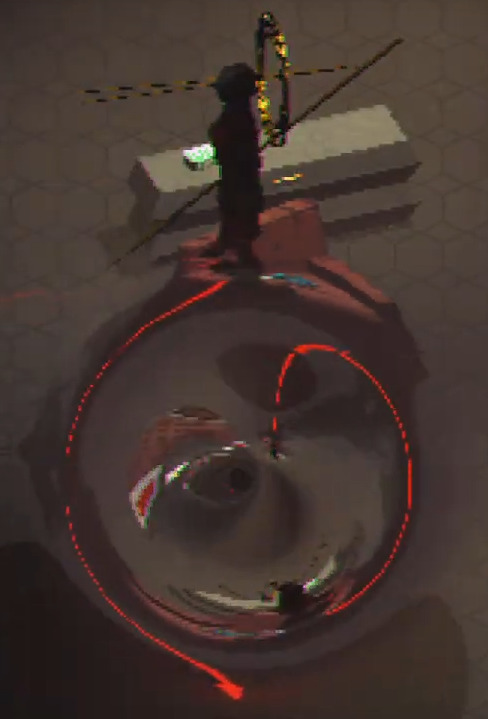
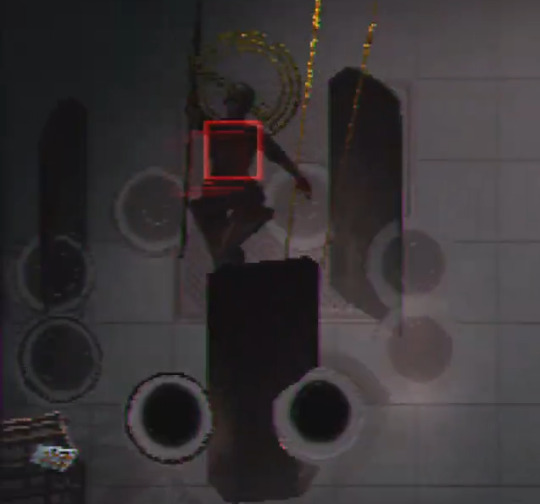
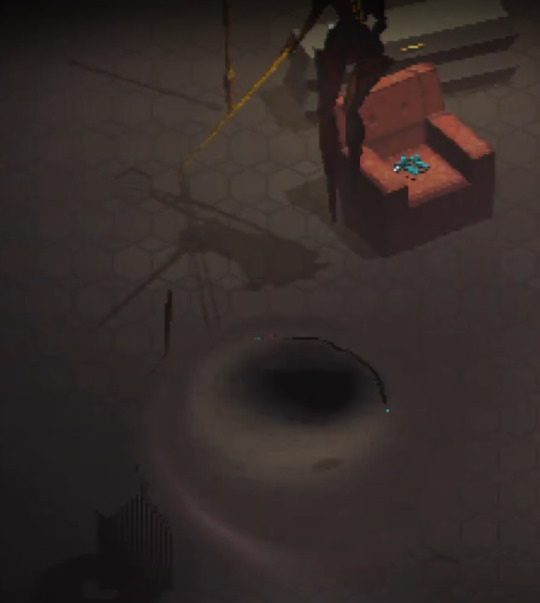
I've also seen it implied that the arena changes which occur during her fight are also an expression of her power to shape reality around her. This idea of her power being widely encompassing of the spectrum of bioresonance, but to a lesser degree is furthered by comparing her then to Ariane. She appears to have a far more vast command of the power if it is to be believed she is the reason for the cycle repeating ad infinitum. She even seems to trump the Kolibri's command as her power is attributed to have been the reason Elster's (And her own) memories were placed in Falke's mind. This is likely also the reason that the LSTR-S2301 was never commissioned as the power somehow rewound time (while also implanting the unit with the LSTR-512 memories and remaking her every time she dies in the facility... Sierpinski Elster stuff is weird, she could be a whole post on her own :/). A book found in the Itou bookstore also says that the power has been used to klimaform planets, and even create artificial gravity. In another place its stated that bioresonance is essential to Replika creation and without it the process is likely impossible. While the first two are vague in how the power is used, it is interesting that the power is essential for creating Replikas, as it means that its power of creation isn't limited to non-living things as Replikas are alive, and bioresonance is essential to make them that way. All of this together paints a rather clear picture that the scope of possible applications of bioresonance isn't only unknown in universe, but even speculatively it appears to have no limit at all. A sufficiently skilled bioresonant adept may be unstoppable with a free ticket to change reality however and whenever they like. The only limiting factor being, first their rarity, and two their supposed loyalties. We know these individuals are rare as there is special exception made to their discovery, and even rarer is their ability to use the power.
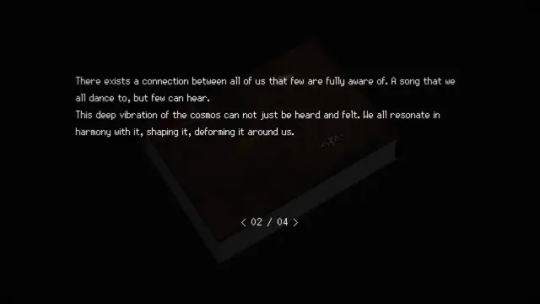
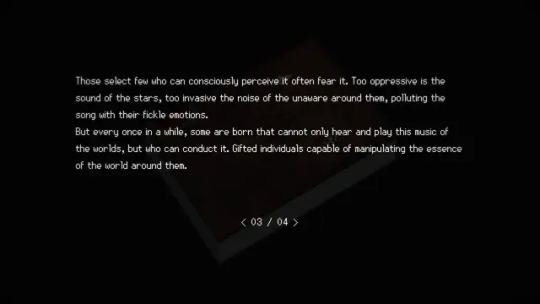
We know that their supposed loyalties may be a issue as the Nation very likely kills any with the power they don't think that can have perfect control over. As any who can command the power well and decides they don't want to bow to either the Nation or the Empire could very well become a problem for both. Therefore it makes sense why we are told they are arrested even if suspected of being able to control the power
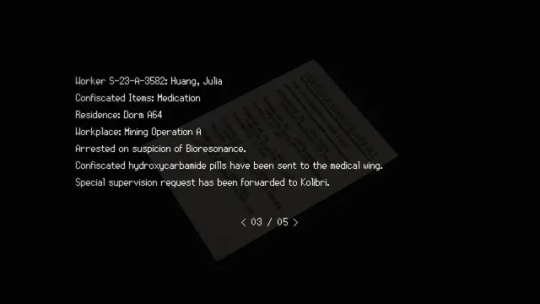
Julia is probably dead btw, not mentioned, but we know somebody with the same last name was trespassing and died in interrogation.
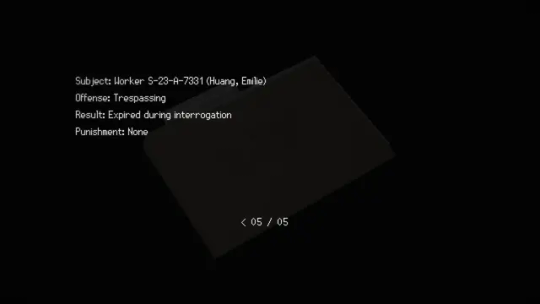
Its possible that those allowed to live are given markings denoting their status, the forehead is clearly visible and would allow them to be kept track of. Something that feels rather fitting, considering the inspiration behind the game.
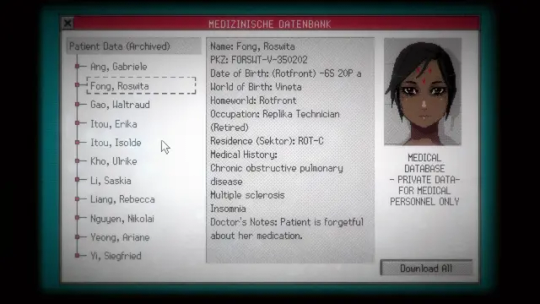
ANYWAY, that's the post. I definitely got a bit rambly, and probably forgot stuff. I may just add them in edits or by reblogging my own post but I hope this was interesting. It's no surprise that this is a sort of god power, with all the talk of god-like beings and individuals becoming gods, but to see/explore the actual extent of this truth is pretty interesting regardless!
#signalis#falke signalis#falke posting#ariane yeong#signalis kolibri#bioresonance#nightly speaks#signalis analysis#thanks for reading :)))
66 notes
·
View notes
Text
How "You" (the player) Made Elster Suffer
SPOILERS FOR SIGNALIS (and its endings)
What elevates video games to an experience that you can only get from said video games and not from books or film or shows is one particular quality: "interactivity". You are not a passive viewer in (most) video games, and a few game developers take this idea to the next level: having your interactions--your agency--affect the outcomes of a game's narrative and direction. In a more typical fashion, a game might have you select a speech option amongst a handful in order to change an event, or to choose your player-character's morality at that moment in time. Perhaps the game might even hit you with a visual reminder that your actions have consequences, or "they will remember that."
Signalis has this quality too, but it's one that often gets overlooked when discussions are had about the game because it's not obvious that it's happening. But rest assured, Signalis remembers 'how you play.' The variables involved are a decently sized list, but for now, the core of what you need to know is that there is a distinct playstyle difference between someone who gets the Promise ending versus someone who might get the Memory or Leave ending. (We will also discuss the Artifact ending briefly afterwards.)

The core of this thesis is that your first playthrough--and your first ending--is incredibly important because that ending is the punctuation at the end of what ought to be a blind playthrough. For extra context, Yuri Stern (one of the two devs behind Rose Engine) once wrote that there were no 'good' or 'bad' endings in Signalis. There is an ending screen that we all get that shows us our own statistics and performance, but the endings were not designed to 'rate' us on how well we performed. Instead, look at the endings from the perspective of Elster. What did Elster experience in your playthrough? Consider how she might have felt at the conclusion of the journey that you, the player, put her through.

If you saw the Promise ending, then Elster had to suffer. In order to get Promise, Elster not only has to kill as many enemies as she can find (and potentially kill those same enemies again), but she also needs to receive a significant amount of damage over the playthrough. Elster needs to be both brought close to death (Deaths Cheated) and entirely die more than a handful of times. The longer your playthrough is or the longer you hold Elster in this "hell" of a reality, as it is described, it becomes even more likely that Elster will receive the Promise ending. Thus, if you genuinely struggled with Signalis' gameplay on your first playthrough, you most likely got the Promise ending. On the other hand, if you were aware of how to get the Promise ending (perhaps this wasn't your first time) and deliberately saw Elster through this process, consider the following: what is Elster's reward after doing violence and having violence done upon her? That a playthrough defined by combat, death, and ultimately failure, ends cloaked in an overwhelming amount of red, and Elster has to commit one more act of violence on the one person she actually cares about.

Elster's Promise ending is as much a physical struggle for her as it is an emotional one. Without getting too deep into an "in-universe" reading of the endings, what we can say for certain is that the fact that this particular ending was titled as 'Promise' leaves me to believe that the emotions centered around the 'Promise' between Elster and Ariane are weighed down by a very real and very deep pain. In this way, one could describe Promise as the more cruel and severe of the endings. Again, this is NOT to say that Promise is a bad ending. Rather, it is the tip of the iceberg.
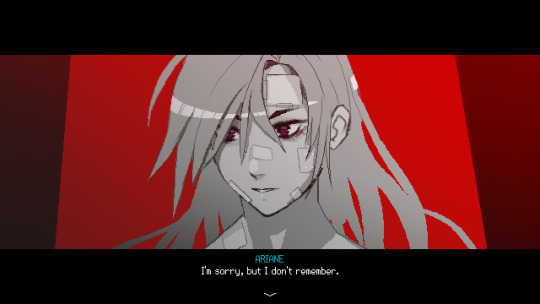
In order to get the Memory ending, you would have to play Elster quite literally like a machine: fast, efficient, and with few errors. Memory is given to players who cleared through the game without much trouble, maybe even to a point of mastery. Did your Elster only kill enemies out of necessity? Did she always keep a forward momentum, rarely getting hurt and seldom dying? Maybe you, the player, are no stranger to survival horrors. Or perhaps games in general come more naturally to you. Regardless of how well you might have performed, the conclusion for Elster here is finding an Ariane who does not remember her.
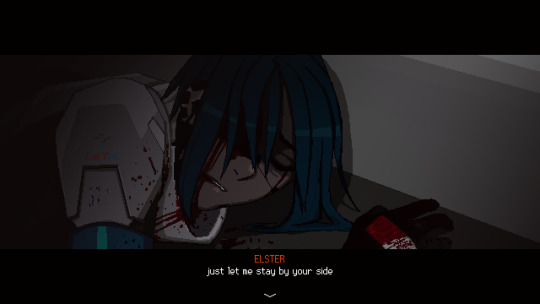
What is the reward supposed to be if you--by most survival horror metrics--played well? Perhaps reward is the wrong word. Perhaps Ariane's actions (or her reactions to Elster) ought to be viewed from another angle. Because look at how Elster reacts to Ariane forgetting her: "It's okay. Please, let me stay by your side a little longer." This scene, for what it is, shows you that no matter how perfect or proficient you might be, someone else could make a mistake. Someone else could forget the promise they made with you. And yet--despite all that--to Elster, Ariane's forgetting did not matter. Because to her, she made the journey, she made it to Ariane's side. And in the end, that's all that mattered to this Elster. It was getting there. That's what was important: the Memory. A heartbreaking ending, surely? But wait, there's more.

There's Leave.
This is perhaps the most peculiar (and contested) ending not just because of its content, but because it requires some highly specific and deliberate actions in order to even unlock--even more so than Promise and Memory. Whereas Memory had Elster focusing on moving to her destination quickly and Promise focused on having Elster linger in the 'hell,' Leave is affected by Elster doing the most to keep herself physically and emotionally safe.
repeatedly attempting to open already known locked doors
exhausting NPC dialogue beyond what they already have to say
having Elster heal constantly as soon as she's hit, staying in blue/nominal health
having Elster far overstay her welcome in those 'memory' sequences (such as on the Penrose, on the beach, and any scene that involves the first-person perspective)
Instead of immersing Elster in the cruelty of the 'hellish reality/dreamscape' she finds herself in--
Instead of having Elster focused on a distinct goal--
If you had Elster linger in the environment, in the presence of other characters, and the past (her 'happier times' perhaps), Elster instead finds a state of twilight.
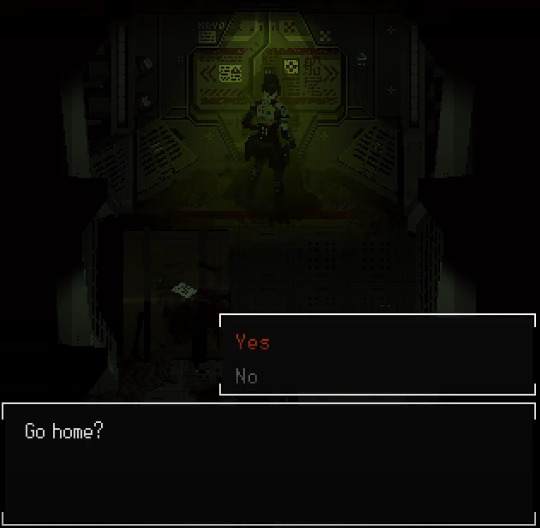
Because the Leave ending starts off the same as the other two: Elster still finds her way to the Penrose, goes inside, read Ariane's notes, finds the body of the original Elster-512, receives the same prompt just before heading to the cryopod that read "Go Home?" and when she accepts it, where does she go? Back outside.

Instead of back out to the endless red desert from before, she's met with a blue, calm night sky seemingly reflected by water. Quite literally, this is the Elster's "twilight." Twilights are a literal signifier for a period of time between daylight and darkness (and vice versa) but they could also signal a period of obscurity and ambiguity. After tossing away her armor and curling up on the ground, Elster almost looks peaceful. Maybe. Because after all that the player put her through (and also what they did not), can we surmise that Elster was able to at least find a little relief at the end?
We never see the inside of the Cryopod in this ending and I have to ask why? Did Elster never go inside? Or was there no one in the cryopod at all?




Allow me to briefly introduce a new idea (I know it's late in this already long essay but stick with me): have we yet considered that every piece of text that shows up on screen like the ones we see above (unless otherwise identified as Alder, Falke, Isa's memory) has always been Ariane talking to Elster? Because here's another detail about Leave, it's the only ending to not include "Remember Our Promise".

We find in Ariane's own notes near 1:1 phrasing as she described why she wanted to leave Rotfront on the Penrose. What comfort could Ariane possibly find after these words flash on the screen: "In the end, I had to leave you behind. I wanted to see you again, but it's too much. Forgive me." That is, unless, the final words in Leave were not meant for her by Elster but for Elster by Ariane. Again, if we're viewing the game from the perspective of the player's/Elster's interactions and experiences having a tangible effect on Elster, then who's to say it did not also do the same with Ariane? How did Ariane feel after witnessing Elster try so desperately to survive, healing at every available opportunity, checking locked doors that would surely never open, talk to other Replikas that were surely doomed? Was the pain too much for Ariane as she realized that this Elster would rather soak in the memories of happier times than to deal with the pain of the cycles? Perhaps Leaving after such reality-bending nightmare is reasonable response for both Ariane and Elster. But this is not to say that Leave is the happier ending.
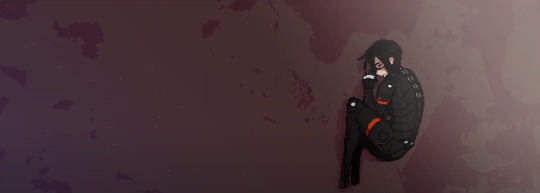
One last thing: the Artifact ending. In fact, acquiring the Artifact ending is in and it of itself a meta-narrative ending. By pure technicality, Artifact is an ending where those who found it first (and the resulting players who looked up the guides made afterward) dig much deeper in the game--into the nature of the dreamlike reality itself--to find a new conclusion through mutual means. In other words, Artifact could not be obtained without multiple players controlling multiple Elsters convening and contributing together, like in the scene showing the graves surrounding a newly created or conceived 'tesseract'--that shiny object in the center, which is also the symbol of the game itself.
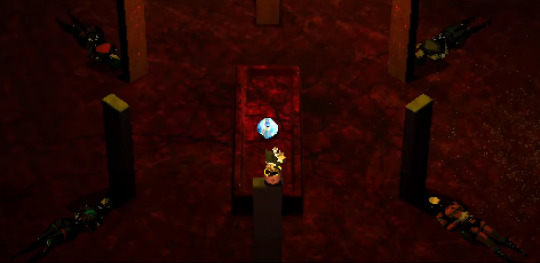

And the results of their (half-literal and half-figurative) ritual was conceiving a new reality?/present?/ideal? where Elster and Ariane are finally together. Does this mean that, with their efforts combined, they found a way to beat death and live with each other once again? It's almost like this ending serves as a congratulatory thank you from the developer just as much as it might serve as an actual extension of the game's events into something new?/hopeful?/neverending? Perhaps it can also be as simple as viewing the dance that Elster and Ariane share as complete and utter wish fulfillment for the viewer (for the player and whoever the Red Eye is). But the Artifact ending rabbit hole is another talk for another time...

Back to Yuri's words from earlier,
"I wish people would be more open to let others figure out for themselves how their ending made them feel. Instead of telling a streamer "you got the best ending!", maybe you can ask "did you think this was an interesting conclusion?" and they can decide if they liked it or not."
If you made it this far, I would like to thank you! Did this perspective of player agency affecting the ending of Signalis make the game more interesting to you? What made your first playthrough of Signalis interesting in the first place?
63 notes
·
View notes
Text
Some analysis about cultural details in SIGNALIS。
Little spoiler。
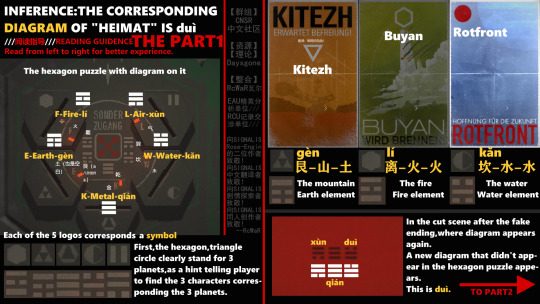
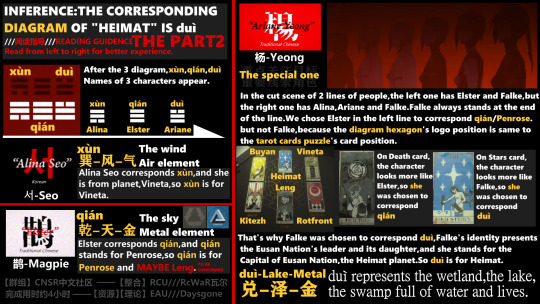
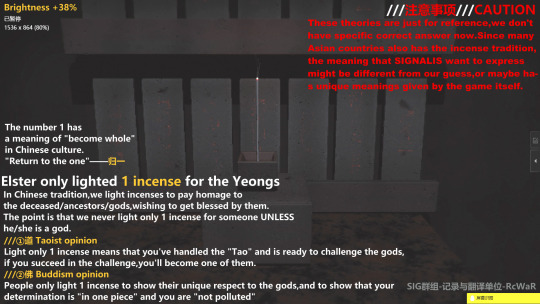
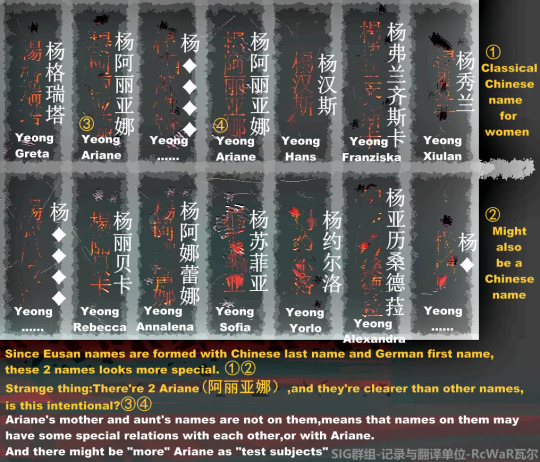
251 notes
·
View notes
Text

#fanart#signalis#finished game yesterday with friend. cool game i died 20 times#I would like to draw something more meaningful but I haven't finished my 2 hours videogame analysis#elster
535 notes
·
View notes
Text
The Red Eye, Godhood, and the King in Yellow

red eyes are everywhere in signalis. surveillance cameras with blinking red lights following your every move, the symbol of the nation is a red eye, those monitors with red hexagons like a wall of red eyes, hell even your viewscreen
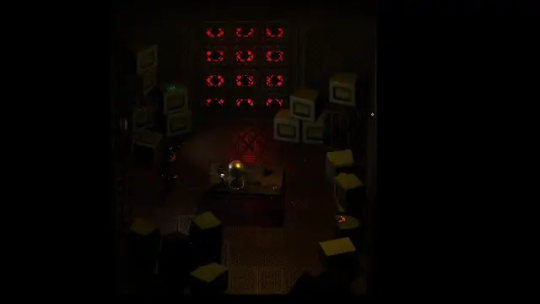
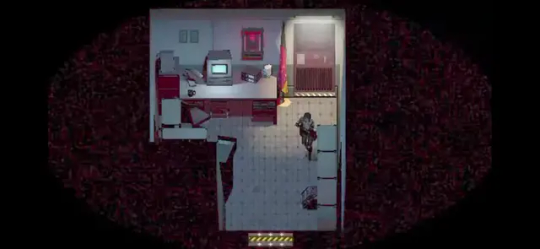
Even Ariane's eyes are red, as she's associated with the red eye, which itself is associated with The Flesh and The King in Yellow and The Empress and bioresonance.
I think this is because in a lot of ways, Ariane is the god of this time loop. It is by her will and bioresonance that we're trapped within it. In this place where reality is in debate, where her beautiful dreams ARE our reality. Some interpretations of the King in Yellow view him as a metaphor for the death of god in the face of decadence, of when artists and philosophers decide that there is no truth higher than their own art, where the beautiful mask becomes reality.
God in the West, in many ways, is connected authoritarianism, what with the Calvinist idea that he predetermines who goes to hell, his all-seeing eyes, his demand for strict obedience. In a lot of ways, Ariane is stuck recreating the Nation's authoritarian control over her life with the power of her own authoritarian godhood, over and over in those loops, like the cycle of abuse, trauma, flashbacks, and learned helplessness, until we put God out of her misery with our own two hands.

#metas#gaming#analysis#xtian hegemony#signalis#the king in yellow#ariane yeong#authoritarianism#also why she and falke look the same beyond the dissolution of self thing
86 notes
·
View notes
Text
The Isle of the Dead painting by Böcklin in R1999
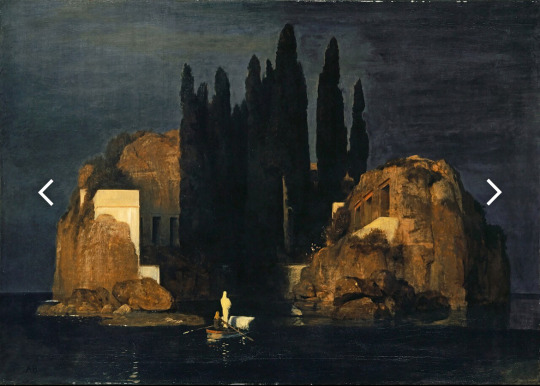
(Ignore the watermarks I cant get rid of them)
Back with another "Reverse 1999 really likes making obscure references to paintings" and this one features in the special EP for 1.9 'Reasons' performed by Dead Marbles.
(Fun fact: I am not an art history major lol, the Oath of Horatii painting was for a French Revolution essay, and a saw a YT short for the Seventh Plague from Hell painting)
(Credit to YT georgieegames for offhandedly mentioning the painting when reacting to the EP, also I recognise the painting from Signalis ... And Im realising the pipeline of doomed yuri again heh)
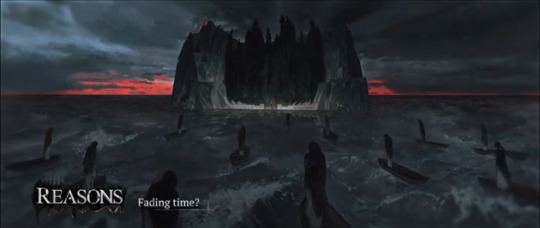
Heres the full shot from the EP. For this painting is harder to discern the intention of its inclusion since the original painter never gave a clear explanation to the painting. What we do know about the painting is its multiple versions, the one above is the 1880s one, other variations include a white and black photograph version with each version showing the walls growing as the figure in the boat gets closer.
(For the EP there are flowers present (maybe roses from the thorns but I cannot see them clearly)
The interpretation most go by is that the figure on the boat is Charon and that they are travelling towards death on the River Styx or River Acheron. The Manus or the Aperion followers that left the island with Sophia are depicted here (you can see the outfit under the cloak in certain closeup shots).
Honestly Arcana is an omen of death at this point, her presence ends in the death, torment and destruction of others.
Alright this part will be tricky to explain and again I am not an art major.
One of the few things Böcklin said about the painting was that it was reminicent of a dream. He was part of the Symbolist Movement that focused "on the use of abstract and metaphorical language and images to represent the absolute truth" (Hypercritic). Freud was also writing similar ideas at the same time. This idea of searching to depict the absolute truth in abstract ways could link to Sophia's search and vengeance in the phenomenal world, seeking a truth that 37 or Aperion could not give her.
The composition does create a feeling of confusion and lack of direction, while the Manus are all heading towards Arcana and Sophia, only Arcana is left assured in heading towards the dark abyss behind her. The whole EP is Sophia's resolve and aftermath of learning the futilty of the teachings she tried to follow: now as part of the Manus having to seek a new path that she may be necessarily be sure of but must follow through regardless.
This is the general idea I got from the painting, its fun to do these (the only one I havent been able to do is the painting in the scene between Constantine and Druvis in Book 3/4 since the painting is too faded and AI has fucked up google search)
#reverse 1999#ramblings#r1999#analysis#sophia reverse 1999#1.9 spoilers#forgor remembered#oh play Signalis its amazing
48 notes
·
View notes
Text

No quotes from a game have had more layers to me than the initially angsty feeling line, “Perhaps, this is hell”
Let me paint a picture for you. This line came up for me after more than 12 hours of fighting through a host of encounters with what seems to be actual undead cyborgs who all seem to have one singular goal: to kill you in particular.
This whole time, your character has one goal in mind, one singular goal which is her driving force for the entire time she’s spent stranded with a downed ship and a missing partner: Keep your promise. If you’ve played Signalis in its entirety, and at least gotten the “Promise” ending, you know that the promise in question in its literal form isn’t as romantic as one might hope for through the course of the game, but I think there’s more to it than that.
In the end, it doesn’t matter what the promise is, it’s entirely metaphorical, it’s a plot device. The promise is Elster’s driving force to keep going forward, to push to find Ariane. Elster’s promise in the end is to come back, to come home.

I choose to read this line as a rejection of the idea that what Elster is doing is just a pointless hell for the sake of prolonged suffering. Perhaps, this is hell. Perhaps, this is just an agonizing circle of pain, but why should you just let the idea that this world is here to make you suffer make you not fight for what you care about?
anyway, play Signalis if you haven’t, it’s really really good.
95 notes
·
View notes
Text
A Brief Informal Analysis of Citizen Sleeper 1 and 2
Spoilers for Citizen Sleeper 1+2, Signalis, and Cowboy Bebop
Long ass essay under the cut
Intro: Imagining the Future
Citizen Sleeper 2: Starward Vector ends by asking you to imagine your future. Your character, a Sleeper; a robotic impression of a person created as a mechanism for paying off your original’s debt, lies in uncertainty as their systems are being rebooted. You do not get to see the results of this procedure, the game only instructs you to think of where you will go, how far your ambitions will take you, who you will hold close to your heart. Similarly, Citizen Sleeper 1 ends by asking you to imagine your future. Whether you leave on the colony ship, leave with your friends, become one with the fungus, or stay on the station you are hiding on, the Eye, your future is uncertain and the game does not elaborate. Citizen Sleeper 1 and 2 both want you to practice being hopeful.
Citizen Sleeper and its sequel are two games close to my heart, and powerfully relevant in the current day and age. As Gareth Damian Martin (the sole developer behind the two games) describes them in their tagline, Citizen Sleeper is about “role playing in the ruins of interplanetary capitalism.” You spend the games interacting with forces beyond your scope and control. You only have one advantage; the trust and aid of the community around you. At its core, Citizen Sleeper’s gameplay revolves around helping others and receiving their help in return.
Our Protagonist and Signalis
It is worth noting the exact details of the condition of the eponymous sleepers; the player characters in the two games. Sleepers are robots running an emulation of a human mind with their memories erased, in an attempt to quell their individuality and autonomy; a disposable tool with no rights created to pay off ones debt as the original sleeps in hope of a better future. Sleepers are dependent on the corporations that created them for immunosuppresant drugs, lest their body reject their vital bio-synthetic organs, a feature confirmed to be intentional by its reversability through updating the sleeper’s software in the second game. Sleepers are fundamentally dependent on mega-corporations in order to live, in a way more visceral than most other people you meet in the games. Sleepers are, legally, property.
Citizen Sleeper is not the only high profile 2022 indie game to feature a future dystopia where your protagonist is a robotic copy of a sleeping human created to work as a slave (which isn’t that many, but it’s weird it happened twice); the 2022 survival horror title Signalis’ protagonist Elster is one such robot. Signalis features a stratified authoritarian society in which the vast majority of the work force consists of Replikas; robots created with the personalities of a few select individuals copied into them, defining their ‘models.’ Similar to Sleepers, Replikas are economic tools, useful as cheap, reproducible staff. Any individuality in a Replika is punished, often the Replika is destroyed completely. However, similar to Citizen Sleeper, the protagonist is able to break from the grasp of economic oppression through human connection with Ariane Yeong; a human, higher than her in social status and intended to view her as disposable. They share a fate together, doomed to die by the nation that sent them on a pointless exploration mission. However, their connection is too strong, and via psychic powers they refuse to surrender their relationship, and thus the plot of Signalis unfolds. Their connection is able to break the rigid, impersonal control imposed upon them.
Although Signalis’ similarities in theme and plot with Citizen Sleeper are a testament to a modern understanding of the oppression and dehumanization we face under the current system (especially given the queer overtones of both of the stories,) Signalis, of course, did not inspire Citizen Sleeper. However, Cowboy Bebop did.
Cowboy Bebop, Citizen Sleeper 2, and the Past
Cowboy Bebop is a 1998 anime series about finding a reason to continue existing despite the continued, soul crushing drudgery of of existence in a capitalist future. Similar to Citizen Sleeper 2 (a game so heavily inspired by Cowboy Bebop, it has multiple direct references to its episodes hidden in achievement names), the characters assemble a ragtag crew of people with a variety of talents and goals, who all feel out of place or without prospects in their original settings. Both settings feature corrupt law enforcement, sprawling yet fragile infrastructure, and a wealth disparity that leaves the typical person struggling to get by on bell-peppers, let alone beef. Crucially, Cowboy Bebop is also about our relationship with the past. In order to continue living, our characters must come to terms with the past; accept that which we can change and that which we cannot, and learn to move forward and live. It is about how sometimes we have to let go of the people we love, and our past roles and relationships; we cannot pretend they are not a part of us but fixation on the past with no regard for the future results in an inability to live in the present.
Citizen Sleeper 2 is a game obsessed on our relationship with our past. The sleeper begins the game, awakened from an interrupted reboot with no memory of their situation, with only others to rely on. Their past, however, is deeply important to their survival; they cannot simply let it go. Characters who reoccur in the second game must reckon with their histories from the first; Bliss and Ankhita their failed relationship, Aki and the other refugees the ruins of their hopes in the form of the colony ships that were destroyed by their journey, Tala now without her bar working under the oppressive reigns of a monopolistic corporation; and they respond not by dwelling in their losses, but in striving together for a better future of collaboration and peace, built in spite of the dominant capitalistic system. But the two most important characters in terms of understanding Citizen Sleeper 2’ s relationship with the past are not returning from the first game.
Yu-Jin is an entrepreneurial explorer who is after a rare relic; a ship drive powerful enough to take him from the belt. The search for this relic embeds you in his old rivalries and conflicts; everyone is attracted by the allure of escape. As your quest continues, one thing become clear; this isn't the first time people have fought over the drive, this conflict extends back as early as the drive’s creation. As you get closer to the drive, the conflict escalates, and one thing becomes clear; the only way Yu-Jin will live is if he makes due with the past and abandons his quest for this dangerous and desirable object. However, he will not come to this conclusion by himself, he can only be saved through his relationship with you.
On the other hand, Junie is another character obsessed with the past. You first encounter Junie at the very start of the game when you take her on a mission to recover a ship core. You are after the ship core to exchange it for the ship part you need to escape the Hexport, where we are trapped at the start of the game, and broaden your horizons. At this point, Junie suddenly appears to be an adversary of sorts; she intends to wipe the core to retrieve the valuable data off of it.
While this initial encounter is negative for most players, by working with Junie throughout the game, you learn of her passion for the past. She views this old data not as a precious artifact for personal gain; in fact she is seeking the refuse society has abandoned, random records and logs no one cares about anymore. She ultimately creates a digital archive for the purpose of this effort, delivering perhaps the most relevant line in the game- “Data is not a currency. It is not a commodity. It is the immaterial output of a system.” Junie sees data preservation as an effort to understand the past so its knowledge and mistakes are not lost, and a brighter future can be built on its foundations.
Citizen Sleeper 2 makes much the same assertion as Cowboy Bebop; we must come to terms with our past. Understanding our past and acknowledging its ramifications is crucial, but we cannot let our past consume us. Fixation on the past and its promises of wealth and happiness will lead us to our ruin, we must make due with the present and strive for a brighter future.
It is thus of no surprise that Citizen Sleeper’s ending section follows a similar formula to Cowboy Bebop’s. As you barrel towards the end, your found family begins to go their separate ways. Crew-mates find their passions and places where they can pursue them; as they begin to make peace with their pasts and strive for their futures. It becomes clear that your found family, as important as it has been for everyone involved, must end, and you must decide when. Unlike Cowboy Bebop’s protagonist Spike, famous for dying because he could not let go of his past, in Citizen Sleeper 2 you submit. And there you lie, awaiting your return to consciousness, and you reflect on your journey. With your future undecided, you must let go of your past, and embrace that this period of your life is over. While nostalgia can be comforting, you will not be able to live unless you move forward.
A Return to Citizen Sleeper 1 and the Queerness of the Sleeper
Citizen Sleeper 1’s sleeper has no past on the station the arrive on, the Eye. Corporate controlled and in crisis, the Eye is not an easy place for a Sleeper hunted by Essen-Arp. Without immediate allies, Capitalism crushes you. You struggle to make enough money for food, and to find a safe place to sleep. But as long as you press forward, you begin to survive. You make friends, allies, enemies, learn who to trust, who to stay clear of, and form a community for yourself. And eventually you discover how to leave the Eye.
Citizen Sleeper 1 has multiple endings unlike the second game. However, in order to understand your options in the second game, we need to understand the fundamental queerness at the heart of Citizen Sleeper.
The Sleeper is an outsider, not seen by most as human. They are dependent on medical supplies controlled by a mega-corporations, and must turn to community regulated alternative supplies to live . They are not allowed to develop conventional relationships, they are consistently ostracized by the society they must live in. Their experience mirrors the experiences of queer people, disabled people, and racial and ethnic minorities globally.
This assertion is mirrored in the people you meet; refugees, single parents, confused youths without parental figures, disabled individuals, the elderly, and queer people. Citizen Sleeper is a series about the people society neglects.
Thus Citizen Sleeper seeks to remind you that despite everything against you, despite society’s efforts to deprive you of them, you still have options. There are people who care about you by virtue of the fact that you are a sentient being. There are solutions, there are places you belong as long as you are able to strive for them. Your options are unconventional, yes, and limited. The average person, for example, wouldn't even consider assimilation to the hive consciousness of a massive fungal organism. The Sleeper’s situation is unfortunate and unconventional, but there are still options because people care.
While the rendition of the series’ ‘cry now’ leitmotif in Citizen Sleeper 2 is called “Imagined Futures,” Citizen Sleeper’s is called “Possible Futures.” While Citizen Sleeper 2 is about being able to envision your place in the world, Citizen Sleeper 1 calls you to understand you have a place. While the world will change around you and seek to drag you down, you deserve to exist.
Role-playing in the Ruins of Interplanetary Capitalism.
Citizen Sleeper’s tagline, “Role-playing in the ruins of interplanetary capitalism,” emphasizes the scale of the forces you face, but equally important is the word “ruins.” The largest corporation is already gone, its systems of oppression destroyed. These systems are collapsing and yet human connection persists. We will outlast capitalism.
Citizen Sleeper and media like it is even more important now than ever. As a trans person in the US I am watching a fascist oligarchy construct an authoritarian state in the interest of consolidating power in the wealthy at the cost of the lives of people like me.
Citizen Sleeper asserts that yes, things are bad, and they often do get worse, but we can through community and compassion, persist and strive and protect each other in search of a better future. Only by employing the agency provided in a video-game is citizen sleeper able to assert this, passivity is not an option. We cannot lay down and die, we will outlast the systems that degrade us, no matter how vast they are, and we can build a better future in the process. Yes, messiness, violence, and greed will persist, humans are not perfect, but the world has the capacity and potential to be so much better. We cannot let these systems destroy us.
Citizen Sleeper is about learning how to hope.
#citizen sleeper#citizen sleeper 2#cowboy bebop#signalis#media analysis#video game analysis#capitalism#scifi
5 notes
·
View notes
Text
*Signalis spoilers included in this post!!*
One of the questions I have on repeat in my mind with all I know from my Signalis playthrough so far is: "How many times has Elster been through this?"
This question first (solidly) came up when the elevator incident happened- When Adler says his bit and pushes Elster into the open shaft and, instead of falling and dying, lands on a cushion of bodies that look strikingly similar to her.
It's not an insane amount, but it's enough to be intentionally disturbing and attention grabbing.... Until you go down to the next floor below and realize "oh. It's a lot fuller than it initially appeared."
And it's reinforced much later than that, as Elster finds her way to the 'Threshold' in the red area, coming across more on her way.
Truly, how many times has Elster been here before? How many times has she woken up and searched? How many times has she died/been killed?
It's definitely been hundreds. Who knows, maybe even thousands?
I feel like she maybe acknowledges this in the red Threshold area. There's just something (or a few somethings) about that scene...
But, in the end, it doesn't matter. She's made a promise. And she'll do anything to keep it.
#casper talks#analysis isn't my strong suit but this was a very poignant thing for me and it won't leave my brain#finding this all out was INSANE!!!!!#signalis#signalis spoilers
20 notes
·
View notes
Text
I never participated in the tlou discourse because I hadn't played any of the games, but now that I've watched someone play the first game I gotta ask........ why was everyone so mad about the plot of part II when part I is far worse. Like I'm sorry wdym Joel escapes with Ellie, completely ignoring her autonomy to decide wether she wants to do this or not, kills her mother's friend and former guardian and lies to her, dooming all humanity, just because he wants to be a dad again and he's too much of an asshole to get a new wife? Fuck this guy fr, glad he gets killed in part II!
#m#video games#never in my life would i have guessed that the wholesome game about a grumpy dad bonding w kid in the apocalypse would end like this#HE LIED TO HER!!! SHE TELLS HER TO SWEAR THAT HE'S TELLING THE TRUTH AND HE LIES TO HER AGAIN!!!!!!!!#not even a 'well he's a morally grey character because he has legit reasons to act like this' no he's just an asshole#and this is supposed to be one of the best games in gaming history!!!!!!!!!!! girl this sucks!!!!!!!!!!!!!!!!!!#im never listening to gamers ever again y'all have the critical analysis of a 4 year old#time and time again i hear 'check out this game it's great' and then it's mid at best#it should be mandatory for gamers to read a good book or watch a good movie to realize just how mid games are#the bar is so low that is creating a wormwhole in the space-time continuum#there are exceptions ofc - disco elysium undertale and signalis are some great examples i can think of rn#but a lot of the games that most gamers put in their top ten - mostly aaa games - are genuinely just mid
3 notes
·
View notes
Text
<warning for Signalis spoilers> Something I found neat about the included picture with some of the releases of the Signalis physical edition is how if you're looking at it straight on it shows Alina and to get it to show Ariane you have to adjust the angle.
It may be unintentional, coincidence, or maybe each one is different but I want to think it's representative of how at first Elster believed she was looking for Alina, and it was only through intentional effort and the false ending she was able to recall it was actually Ariane she was after. In the same way, it takes the intent to shift the angle of the photo from looking straight on, for it to show Ariane over Alina.
Both show how there must direct intent to not have Alina overlap Ariane and there must be intent to look past what can be seen on the surface. Example here:
Picture from straight on view:

Picture from a slightly lowered angle:
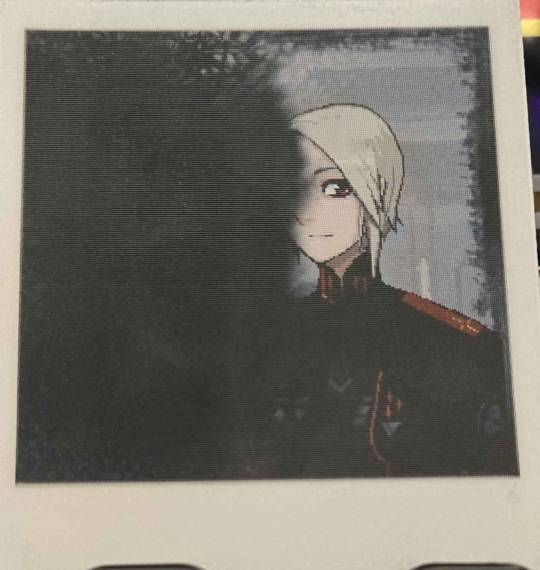
Anyway I just thought that was neat. But that wasn't the only thing i noticed! The above pictures aren't the best example, on the bottom right of the pictures is a number that changes based on angle too. For Alina the number is 6, and for Ariane it's 4. To be honest I don't really have an idea for what that could represent, the only thing I can think of is the number of picture in the cartridge, but then it feels odd that Ariane's number implies hers was taken before Alina's. Sure they could be from different cartridges, but with a game like Signalis it feels like an odd detail to specifically include. I'm open to other ideas though if its a more general polaroid thing... I've meant to do more research, but I'm still sick so who knows :)))
28 notes
·
View notes
Text
big pink neon hearts popping into my eyes when you let me sit on your lap and infodump on you about SIGNALIS, the award winning indie survival horror game about communist space lesbians beyond the oort cloud separated yet bound by something intimate and horrifying beyond any earthly comprehension
#with required reading: codex entry's 3 hour long analysis of the game “perhaps this is hell” featuring sulmathul#signalis
12 notes
·
View notes
Text
Some analysis about cultural details in SIGNALIS。
Little spoiler。
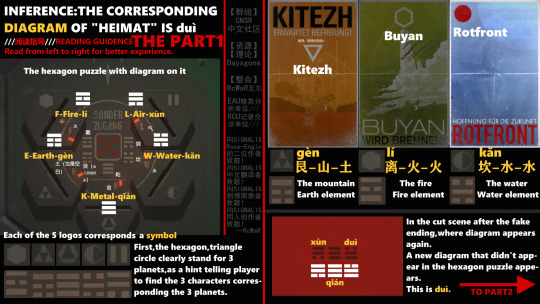
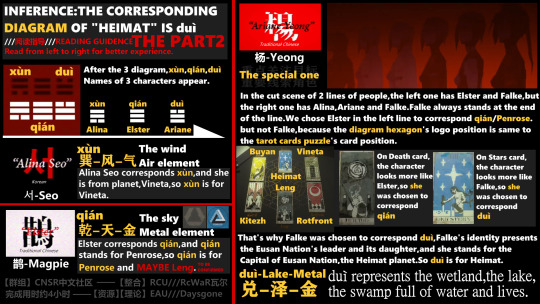
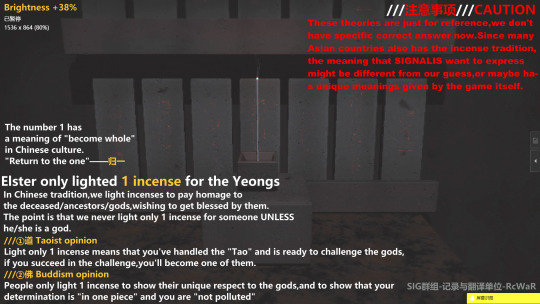
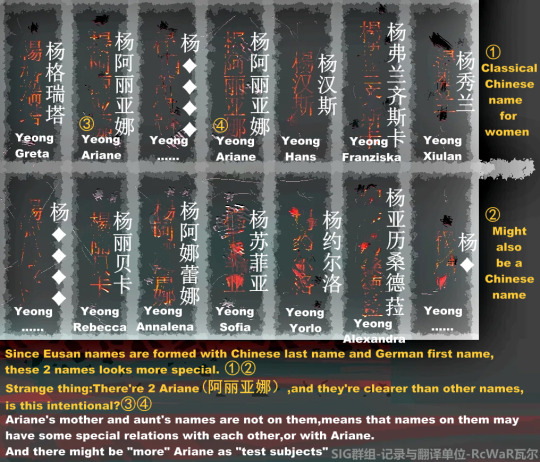
11 notes
·
View notes
Text
man, the more I think about Signalis, the more frustrated I feel with my playthrough of it. I streamed it, so I was helped by chat a little bit, but the whole time I feel like I was just Not Getting It... like, I was waiting right up until the end for some plot beat that would make it all make sense, and that didn't seem to happen? I can't stop thinking about the game, but also how lacking my ability to figure things out for myself is. It must have been so frustrating for Signalis fans to watch me play and fail to understand what's happening so hard...
I'm annoyed at myself for not getting it, especially since I used to consider myself quite analytical, and thought I'd be good at figuring things out and understanding symbolism :x
#signalis#I'm so sorry to signalis fans for being bad at following along and not understanding the game </3#sigh#I'm annoyed at myself for not getting it#you can watch my full playthrough on YouTube#but... I'm Bad at it#gameplay and analysis wise i guess :x
10 notes
·
View notes
Text
i think i really love how visceral the politics of signalis is. not just in the in-your-face propaganda aspects. but like, the way it dooms the narrative.
the whole plot of signalis is based around two entirely disconnected settings -- the Penrose ship and the Sierpinski prison. They are so disconnected from each other across time and space that you spend the whole first half of the game disoriented by the whiplash these two locations give you.
and personally? I stayed confused until I realized what connected them:
they're the two branching paths of Ariane's future.
after her military service, she gets a state letter informing her that if she's not accepted into the Penrose program, she'll be sent to Sierpinski, a "re-education" camp that's actually just a prison mine.
And, to her luck, she "somehow did end up joining the Nation's Penrose Program, the same one on the posters she had seen years prior."
I love and hate the way the wiki frames it, because yes the Penrose space expedition program seemed preferable to the prison camp.Yes, she had seen posters of it and glamorized it as a new start for her. After all, she was an art-obsessed outsider in a world where people molded into being unfeeling machines, where art is frivolous and degenerate except for how it serves as propaganda. Why not dream of a new planet?
But it's all a lie. The Penrose program sounds too good to be true for Ariane-- how can this under-qualified, ostracized freak get accepted into such a prestigious program? -- because it IS too good to be true.
The truth of the program is that it's a glorified propaganda tool, and a useful way to get rid of political enemies. Just send them off into space and tell them it's for the good of the empire, to find new planets to colonize. Then, after 7.74 years of loyal service to the program, tell them:

If you have not found a suitable world for landing by this point, accept that you will not. Find solace in the thought that others might be successful where you failed.

Remenber, you will die having served your Nation by partaking in a glorious demonstration of our power. --- End of decrypted transmission ---
As you are probably aware, your ship's spare parts and rations will soon be depleted.
Penrose is ostensibly about founding new colonies on different planets, but the reality is that these vessels seem to have very little planning put into them, like throwing darts at the wall and hoping one of them will stick. Some people wonder about the efficacy of wasting ships of supplies for this seemingly useless endeavor, but they're missing the point and buying into the propaganda.
The truth is that Ariane was just a pawn for their political power play, quite literally a demonstration of their power, like a horrifying version of The Tallest sending Invader Zim on a useless quest to conquer Earth to keep him out of their hair, like Ozai banishing Zuko off to chase a hundred year old myth. And it cost Ariane her future.
And like, that means no matter what, Ariane never had a future. Penrose is death by space, and Sierpinski is death by mines. She never had a choice, only the illusion of one, because she was doomed by the political reality of living in under an authoritarian state that would never value her.
And like, it's so impossible to ignore the similarities of this to the Cultural Revolution in China. I think the retro aesthetic of the nation references that, along with the Chinese characters littering all the walls.
Ariane's story reminds me a lot of Ye Wenjie's story from the 3 Body Problem, as a similarly powerful woman who also dooms the whole world because of the ANGUISH of the Cultural Revolution destroying her future.



Except, unlike Ye Wenjie, we're not going to get a bunch of assholes calling her an Eve, doomer of mankind. Instead, the story actually succeeds at portraying Ariane as a tragedy doomed by the narrative.
42 notes
·
View notes
Note
can i get your sources and more reading material on nihilistic lesbianism? i am genuinely curious about the theoretical framework
Nihilistic Lesbianism is the belief that lesbians exist and that they are, to some degree, insignificant. It occupies the middle ground between Purposeful Heterosexuality (the purpose of life is to find someone of the opposite sex that you can make babies with) and Sapphic Chauvinism (love between two women is inherently superior to all other relationships). To ascribe aspects of divine power or purpose to a woman's love for another woman is delusional. To think that one could find salvation through procreation is equally delusional.
Any work that depicts the existence of lesbians, while emphasizing how little impact their sexual orientation has on their lives, is canon to nihilistic lesbianism. One example is the game Signalis where various lesbians (confirmed and unconfirmed) are subjected to horrifying political machinations and incomprehensible cosmic forces. The victims are chosen, not because of their sexual orientation, but merely because they happened to be alive in the wrong place and time. Under different circumstances, a different group of people could've been the victims. Or that other group is subjected to the same crisis as the lesbians, and neither of them survive.
Which brings us to broadening the scope of the ideology to form Nihilistic Homosexuality. It is the belief that homosexuals of all genders exist, but their significance to the universe is negligible. It is also a rejection of the perpetuation of multigenerational trauma which is seen as a necessary evil by heteronormative ideologies.
In conclusion, the only good thing about a tragic narrative is that it has to end and the best way to do that is with love.
Sources are below the cut:
youtube
I MADE UP THIS IDEOLOGY AFTER PLAYING SIGNALIS!
I AM THE PRIMARY SOURCE!!!!
I TRIED USING GOOGLE AND ALL I GOT WAS THIS
6 notes
·
View notes